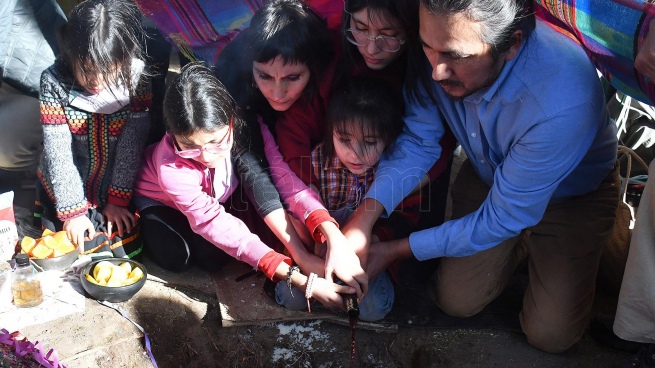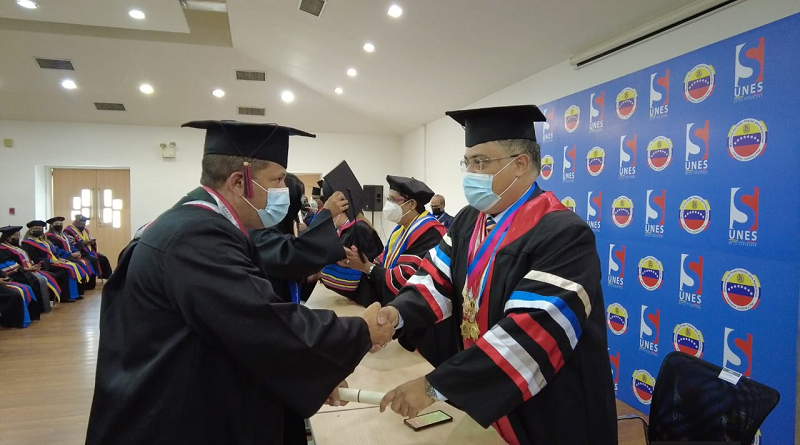A marriage of surgeons, Sandro Rodríguez (49) and Maira Ávila (43), lead a group of professionals rooted in aboriginal cultures, who for several years have been working in Córdoba for “interculturality in Primary Health Care ( APS), which is integrative of other knowledge ontologies”.
These medicine and social science professionals from Córdoba promote awareness actions, also rethinking the training of professionals, and health system policies, so that access to inclusive, intercultural health care is guaranteed. and discriminatory against the original and migrant population.
In this sense, Rodríguez considers it very important that “the biotic and abiotic factors of the ecosystem be considered in a balanced way”, understanding that “medicine has a very biomedical view of health. It deals mainly with biological aspects” (biochemical, genetic, molecular , cellular and diseases of the body).
The professional, in statements to Télam, maintained that health, illness, life and death “should be approached not only from the biological and social, but also from cultural, spiritual and cosmic beliefs and practices”and that, when this does not happen, discrimination, xenophobia and transphobia are incurred at the time of the practices.
The doctor from Salta, with a diaguita past, and with strong ancestral roots that are reflected in his customs and traditions, proposed to conduct the interview with Télam together with his wife from San Juan on August 1, during the Pachamama ceremony, in the Plaza Cisneros del Alberdi neighborhood in the city of Córdoba, where he participated in the “corpachada”, which consists of offering and feeding “Mother Earth”.
In Argentina, and particularly in Córdoba, the historical hegemony “has made invisible the presence of indigenous peoples with ‘extinctionist’ (sic) discourses, which remain latent in the social imaginary and have a negative impact on the recognition of indigenous peoples and the guarantee of their rights,” he questioned.
Within the framework of the different activities that they have been carrying out in order to promote the worldview and indigenous ethnomedicine, both doctors formed a group of seven professionals who, last year, dictated a “Diploma in Health and Interculturality” in the Faculty of Medical Sciences of the National University of Córdoba (UNC), through an agreement with the provincial Ministry of Health.
Ávila, for his part, maintained that they are awaiting approval for the dictation of the second cohort, Maira maintained and explained that in this diploma, which was “successful”, interculturality in health is presented as “the ability to act in a balanced between cultural knowledge, beliefs, and practices.
In this regard, he explained that in the case of the province of Córdoba “40 organized indigenous communities coexist” and, based on studies carried out by the Institute of Anthropology of Córdoba (Idacor), 76% of the contemporary inhabitants of the province have Indo-American maternal lineage, 16% European and 8% African.
“In the world there are as many medicines as peoples”Therefore, one of the questions has to do with “biologist training and practices and scientific medicine as the only legitimate health model,” reproached the doctor and mother of four children with her husband Rodríguez.
The doctor, who traces her genetic fingerprints, who self-perceives of Warpe and Mapuche origins from the Cuyo area of Guanacache and Mapuche from the Chilean mountain ranges, considered that in this context of intercultural health in that diversity “There has to be a dialogue that allows interaction and interconsultation with all intercultural knowledge, including gender diversity.”
On the subject, he adds that this dialogue has to take place between Western scientific biomedical medicine, medicinal practices based on the traditional, beliefs, curanderismo, shamanism and diversity of therapeutic knowledge “that allows generating empathy and trust between the doctor and the patient of the indigenous communities”.
He also said that it is very important that the medical professional “does not disqualify the traditional and popular practices that are practiced in the different indigenous communities”, and so that this does not happen universities should train and include intercultural health in their curriculabecause the population is not homogeneous.
When asked if what they are proposing could involve the risk of legitimizing some healing practices considered illegal by current legislation, Ávila asserted that “the intercultural practices of medicine are legitimized, what happened is that they have been suspended, intervened and culturally eradicated” by the monopolies of the health systems, “however, the practices continue in the populations”.
Sandro and Maira practice their profession as doctors in the city of Córdoba, they also work as university teachers and at the Institute of Aboriginal Culture (ICA) where teachers of music, history, anthropology and also the Quechua, Mapuche and Guaraní languages are taught. .










